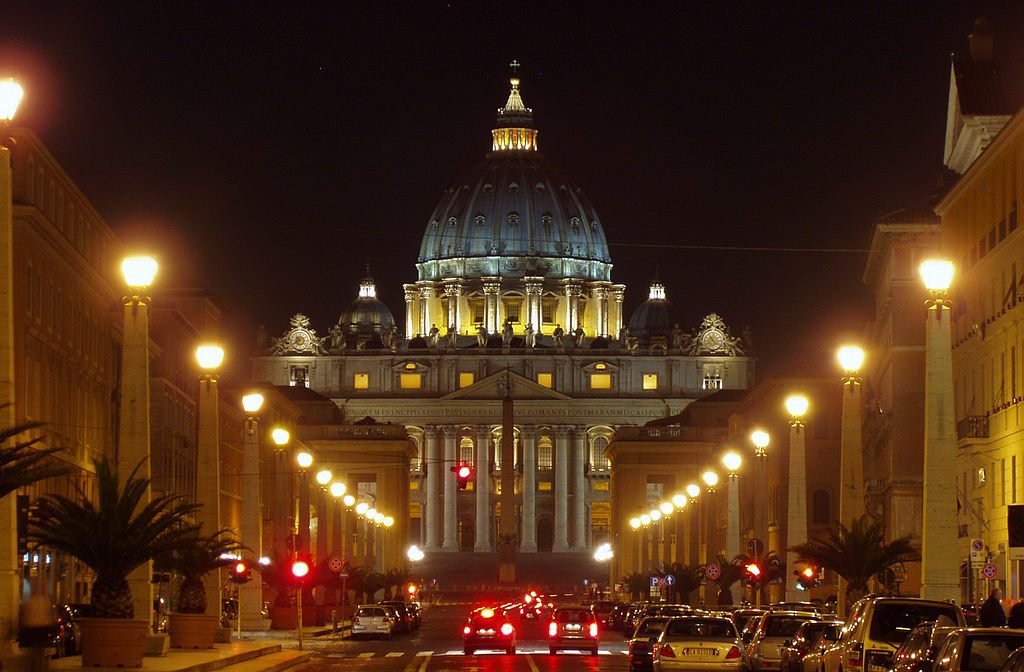
The Congregation for the Doctrine of the Faith added yet another to a long list of proclamations that makes it clear that the Vatican, under Benedict’s leadership, is bent on burying—er clarifying—Vatican II. Just days after Benedict issued a motu proprio announcing the return of the Latin mass, the CDF announced that, in effect, the Protestant denominations suffer from a “wound” because they are not the true Church. This makes absolutely explicit the conclusions which were only mildly explicit in Dominus Iesus, issued in 2000 when Cardinal Ratzinger was head of the CDF.
From Dominus Iesus:
Inter-religious dialogue, therefore, as part of her evangelizing mission, is just one of the actions of the Church in her mission ad gentes. Equality, which is a presupposition of inter-religious dialogue, refers to the equal personal dignity of the parties in dialogue, not to doctrinal content, nor even less to the position of Jesus Christ—who is God himself made man—in relation to the founders of the other religions. Indeed, the Church, guided by charity and respect for freedom, must be primarily committed to proclaiming to all people the truth definitively revealed by the Lord, and to announcing the necessity of conversion to Jesus Christ and of adherence to the Church through Baptism and the other sacraments, in order to participate fully in communion with God, the Father, Son and Holy Spirit. Thus, the certainty of the universal salvific will of God does not diminish, but rather increases the duty and urgency of the proclamation of salvation and of conversion to the Lord Jesus Christ.
In a previous post, I had discussed the proposal of an ecclesiology of friendship by Professor John Dadosky. Whereas the Roman Catholic Church has traditionally regarded itself (herself) as assuming a self–mediating role in its mission to the rest of the world (ad gentes), Dadosky suggested it should adopt a mutually self–mediating role in which equality of the parties to dialogue would mean that the Church might be changed by such dialogue. (As opposed to the notion of “equality” envisioned in Dominus Iesus above.) I had noted that as the discussion unfolded, there was some debate as to how the (Roman) Church should characterize the “Other” (i.e. those to whom the Church is called to convert.) At that occasion, it seemed to be universally acknowledged that Protestants are not “Other” (which was a relief to me). However, at the time, I did not realize how significant it was that I happened to be sitting in a room full of Jesuits.
As an outsider, it is difficult to discern, but one wonders if perhaps in its swing to a more conservative position, the Vatican hasn’t also targeted Jesuits as a cause for concern. With its March 14th Notification on the works of Jon Sobrino, one wonders …
While it is easy for a Protestant to dismiss the Notification and the motu proprio as internal matters—interesting to note, but not terribly consequential—can the same be said for this latest document? After all, now that they’ve made it absolutely clear that Protestants do, in fact, belong to the “Other,” it turns out they’re talking about us! More than that, they have designs on our souls. Should we worry?
1. I think, like the leadership in every religious organization (including my own), the Vatican grossly overestimates the extent to which the average member cares about this or any other issue.
2. While the Vatican’s terms of reference are both patronizing and insulting, I am not particularly aggrieved, because, at bottom, the proclamation has nothing to do with me. It is not intended for my benefit nor does it speak to my need. Instead, it is evidence of Rome’s wound. Notwithstanding that Rome justifies her mission to the world (ad gentes) by reference to Christ’s commission as recorded in the NT, nevertheless, the impulse to turn people to one’s own point of view is driven by one’s own need. Persuasion is the art of self–persuasion first. It helps us bolster our own sense of identity and is driven by fear—the fear that we are empty and pointless after all. So, rather than be angry, I grieve for the Vatican’s fear and insecurity.
3. I also grieve for the countless Roman Catholics who are embarrassed by this proclamation, or are placed in embarrassing positions. Millions of families throughout the world (including mine), see people of different faith traditions living well together. They do this by honouring one another’s traditions and by recognizing that within each lies wisdom and, most importantly, that no single institution plays guardian to truth over and above all others (notwithstanding the Vatican’s claims about itself). The Vatican drives a wedge, not merely into the institutions that share some claim to the idea of church, but also into the hearts of millions of believers and non–believers alike. I cringe in embarrassment for members of my own family, and I hope that they understand that I in no way hold them accountable for the decisions of a handful of needy old men.
Update: John Dadosky advises that his paper on an ecclesiology of friendship has just be accepted for publication by Blackwell and will appear in Oct, 2008. However, he expects an electronic copy will be available from their website in a little over a month.
Photo Credit: Emilio García [CC BY-SA 2.0 (https://creativecommons.org/licenses/by-sa/2.0)]